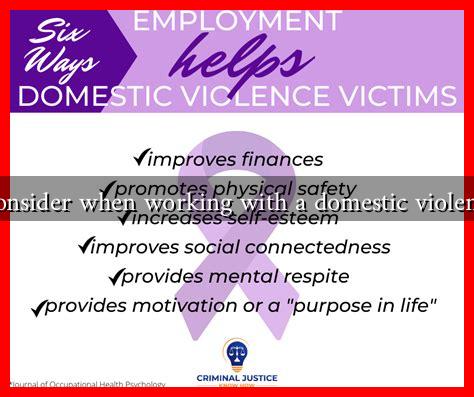-
Table of Contents
What to Consider When Working with a Domestic Violence Victim
Domestic violence is a pervasive issue that affects millions of individuals across the globe. According to the World Health Organization, approximately 1 in 3 women and 1 in 4 men have experienced physical or sexual violence from an intimate partner. When working with victims of domestic violence, it is crucial to approach the situation with sensitivity, understanding, and a well-informed perspective. This article outlines key considerations for effectively supporting domestic violence victims.
Understanding the Dynamics of Domestic Violence
Before engaging with a victim, it is essential to understand the complex dynamics of domestic violence. This includes recognizing the cycle of abuse, which often consists of three phases: tension building, the abusive incident, and the honeymoon phase. Victims may feel trapped in this cycle, making it difficult for them to leave their abuser.
- Power and Control: Abusers often use tactics such as intimidation, emotional manipulation, and isolation to maintain control over their victims.
- Fear and Shame: Victims may feel ashamed of their situation or fear retaliation from their abuser if they seek help.
- Isolation: Many abusers isolate their victims from friends and family, making it harder for them to seek support.
Creating a Safe Environment
When working with a domestic violence victim, creating a safe and supportive environment is paramount. This can significantly impact their willingness to share their experiences and seek help.
- Confidentiality: Ensure that conversations are private and confidential. Victims need to feel secure that their information will not be disclosed without their consent.
- Non-Judgmental Attitude: Approach the victim with empathy and without judgment. Avoid making assumptions about their situation or choices.
- Active Listening: Practice active listening by giving the victim your full attention. Validate their feelings and experiences without interrupting.
Providing Resources and Support
Victims of domestic violence often require various forms of support, including emotional, legal, and financial assistance. Being knowledgeable about available resources can empower victims to take the next steps toward safety.
- Hotlines and Shelters: Familiarize yourself with local domestic violence hotlines and shelters. Organizations like the National Domestic Violence Hotline (1-800-799-7233) can provide immediate assistance.
- Legal Aid: Inform victims about legal resources, such as restraining orders and family law services, that can help them navigate their situation.
- Counseling Services: Encourage victims to seek counseling or therapy to address the emotional trauma associated with domestic violence.
Empowering Victims
Empowerment is a critical aspect of supporting domestic violence victims. It is essential to respect their autonomy and choices, even if they differ from what you might recommend.
- Respect Their Decisions: Understand that leaving an abusive relationship is a complex decision. Support their choices, whether they decide to stay or leave.
- Encourage Self-Advocacy: Help victims develop self-advocacy skills, enabling them to express their needs and desires effectively.
- Build a Support Network: Encourage victims to reconnect with trusted friends and family members who can provide emotional support.
Recognizing Signs of Trauma
Victims of domestic violence may exhibit various signs of trauma, including anxiety, depression, and post-traumatic stress disorder (PTSD). Being aware of these signs can help you provide appropriate support.
- Emotional Distress: Victims may experience mood swings, irritability, or emotional numbness.
- Physical Symptoms: Look for signs of physical abuse, such as bruises or injuries, as well as stress-related symptoms like headaches or gastrointestinal issues.
- Withdrawal: Victims may withdraw from social interactions or activities they once enjoyed.
Conclusion
Working with domestic violence victims requires a compassionate and informed approach. By understanding the dynamics of abuse, creating a safe environment, providing resources, empowering victims, and recognizing signs of trauma, you can make a meaningful difference in their lives. Remember, the journey to healing is often long and complex, but your support can be a vital part of their recovery process. For more information and resources, consider visiting the [National Coalition Against Domestic Violence](https://ncadv.org/) for further guidance.

